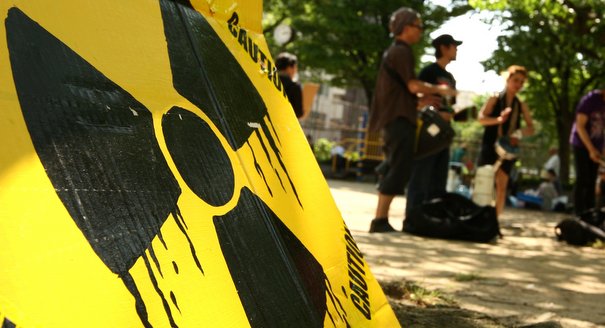Registration
You will receive an email confirming your registration.
IMGXYZ3702IMGZYXThe impact of the Fukushima Daiichi nuclear disaster on the global nuclear energy industry can clearly be seen one year later. Germany has already closed some of its nuclear plants and plans to phase out others. The Italian population roundly rejected nuclear energy in a referendum last summer. China, as a power with growing nuclear energy interests, continues to shape its response. In the eighth installment of the “Arms Control Seminar Series,” Carnegie’s James Acton discussed the indicators that could have prevented the nuclear disaster and their implications for China with a panel of Chinese and international experts at the Carnegie-Tsinghua Center for Global Policy. Carnegie’s Lora Saalman moderated.
Lessons Learned from Fukushima
The accident at Fukushima Daiichi was triggered when the reactors, which were designed to withstand a 5.7 meter tsunami, were inundated by a 13.1 meter wave. Acton explained that the accident was the result of a series of man-made errors and nuclear safety practices that lagged behind international standards, including:
- A False Belief: Most fundamentally, Acton argued that Japanese industry and regulators simply did not believe that a major accident was possible. As a result, they did not make adequate preparations, including for a prolonged loss of power to a nuclear facility.
- Lack of Regulatory Independence: Japan’s Nuclear and Industrial Safety Agency (NISA) was not independent from the government, Acton explained. Instead, it was a part of the Ministry of Economy, Trade and Industry, the government body responsible for promoting nuclear power. This lack of independence also hindered the regulator’s ability to think “out-of-the-box,” he said, which contributed to an underestimation of the potential threat of tsunamis.
- Lack of Communication: An insufficiently broad range of experts contributed to the overall discussion about nuclear safety in Japan, Acton exlpained. Had there been more effective consultations with experts on the natural disaster history of the region, then the appearance of a tsunami of such height would have been more likely to have been factored into the original design or later improvements.
- Hazard Prediction and Design: Japanese approaches to hazard prediction and plant design had significant flaws compared to international best practices. For instance, Acton said, emergency diesel generators, which were critical to supplying power to the cooling systems, were much less protected in Japan than in Europe. A Chinese panelist added that the upgrading of nuclear facilities in China and the design of new plants with much greater redundancy made a disaster similar to Fukushima highly unlikely.
Fukushima’s Implications for China
One Chinese expert explained that China and Japan use very different reactors for their nuclear energy programs. With the introduction of such systems as the AP1000 nuclear reactor, which has a “passive” gravity-driven cooling system that does not rely on external power, the chances of a meltdown are much lower. Acton agreed with this assessment to a degree, but added that no system is entirely autonomous and even passive systems will at some point rely on external intervention if faced with a prolonged crisis.
- Expanding Education: One of the Chinese experts explained that in the wake of Fukushima, China has increased its openness to external exchange and education on nuclear safety. He highlighted the fact that China has been working to send more of its experts abroad to expand their exposure to emergency preparedness. An international participant objected, pointing out that representatives from China’s nuclear regulators and industry are often missing from international forums on nuclear safety. A Chinese panelist argued that to facilitate greater Chinese participation more of these events should be held in Asia.
- Greater Scrutiny: Another Chinese expert said that the lessons of Fukushima have already permeated China, which expanded its departments working on nuclear safety to include a top-down assessment of all existing and planned nuclear plants. This, he argued, has slowed the approval process and led to greater scrutiny of the safety, standards, and design of each project.
- International Cooperation: One of the Chinese experts suggested that the best way to learn from the Fukushima disaster is to increase international cooperation and coordination. He argued that the current system, divided into multiple organizations and groups like the International Atomic Energy Agency and the World Association of Nuclear Operators, lacks sufficient coordination and communication. He noted that inclusion of the issue of nuclear safety at the Nuclear Security Summit indicates that it remains at the top of many countries’ agendas. He advocated a new international treaty and standards for nuclear plant design.
- Moral Hazard and Over Design: Acton responded that while greater international cooperation and coordination is a positive development, it must be tempered by the risk of moral hazard in which the existence of an international regulatory system might decrease countries’ sense of responsibility for nuclear safety. This could lead them to be less stringent and accountable. Moreover, Acton argued that an international nuclear regulatory superstructure might not prove to be as rigorous as many countries’ existing national regimes because some states might be opposed to the costs associated with enhanced safety. As a result, a balance must be achieved between international cooperation and domestic responsibility to address the potential of a Fukushima-type accident from occurring in another country.
Discussants: Zou Yunhua, Li Hong, Zhai Dequan, Han Hua, Hong Yuan, Yang Xilian, Hu Yumin, Zhong Zhong, Liu Chong, Li Deshun, Wu Riqiang, Lin Yunzhi, Martin Schoenbauer, James Barker, Eugene Bae, Paloma Hill, Shao Jun
